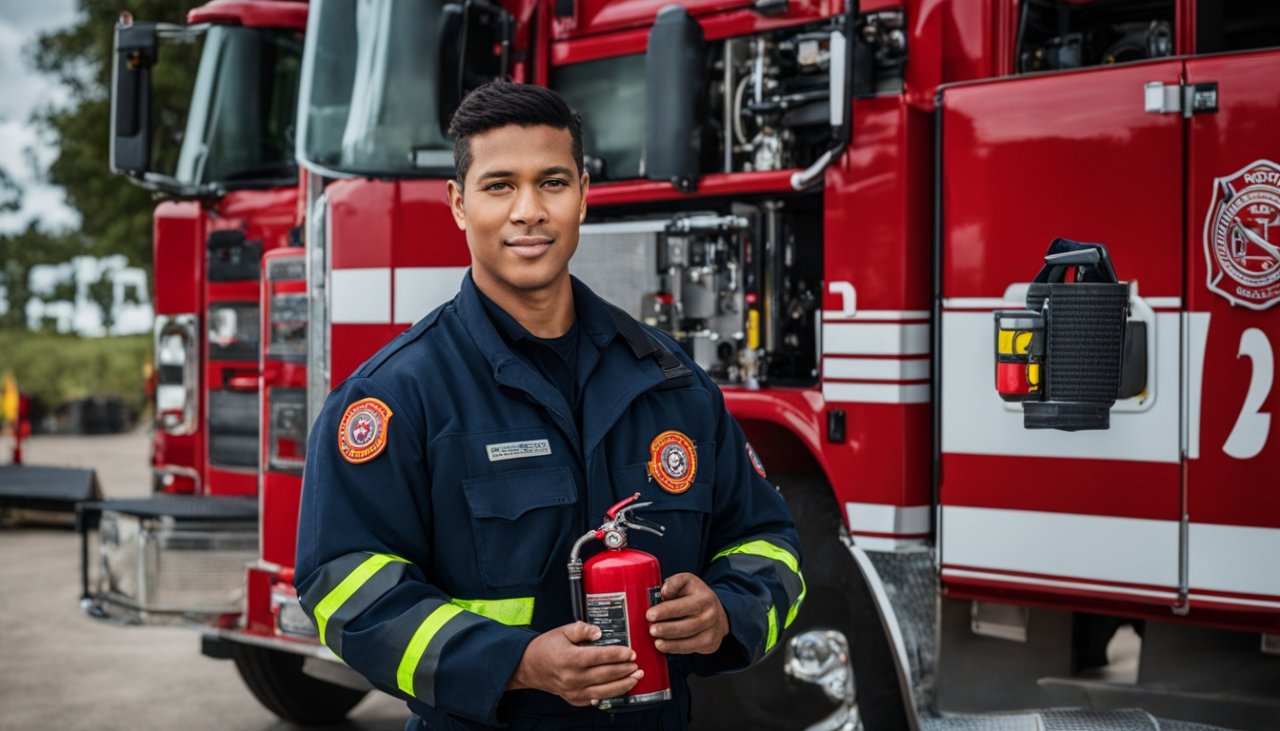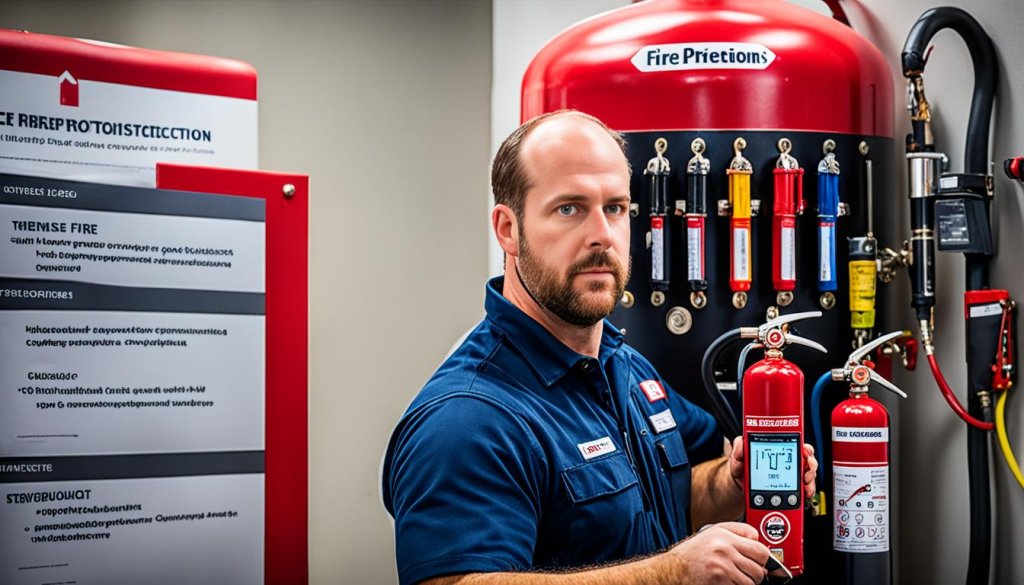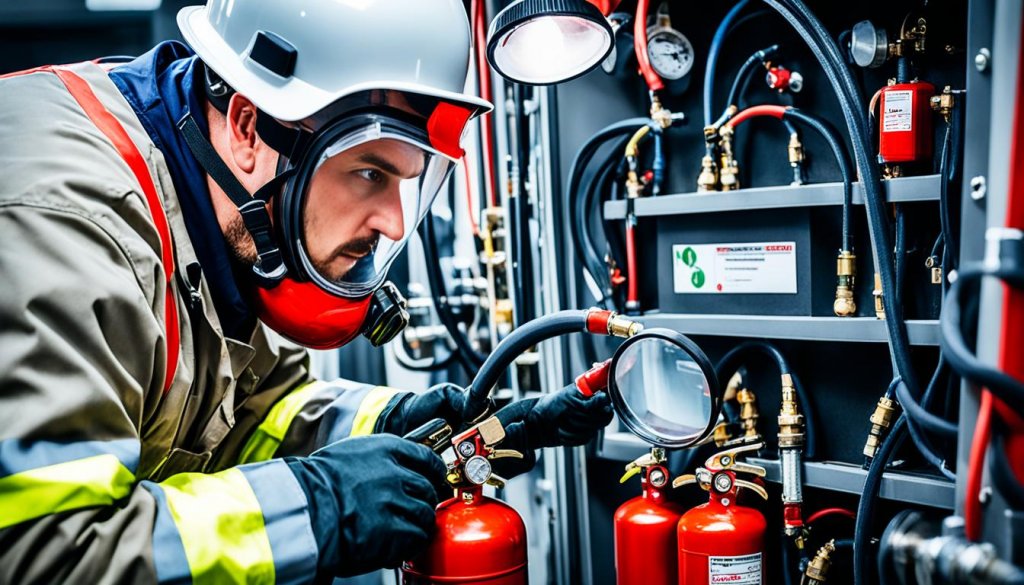Ever thought about how our buildings stay safe thanks to fire equipment technicians? Their training and certification are key. They make sure our fire equipment works right, keeping us safe. Let’s look at why keeping up with training and following national standards is so important for fire safety experts.

Key Takeaways
- The Fire Alarm Systems certification program has four levels: Levels I – IV.
- Certification must be maintained through Continuing Professional Development (CPD) and recertified every three years.
- Level I exam can be administered online with a remote proctor.
- Minimum PPE is required for students, including helmet and work boots.
- Courses align with NFPA standards, ensuring technicians meet industry requirements.
- Rescheduling exams is complimentary if done more than 24 hours before the test date.
The Importance of Fire Equipment Technician Certification
Fire equipment technician certification is very important. Every day, over 200 workplace fires happen, showing the need for skilled people in fire safety. Getting certified opens doors in the fire protection field and prepares me for emergencies.
Training in fire safety equipment is key to reducing fire risks. I learn to spot fire safety issues and fix them. Knowing about fire hazards like clutter and bad wiring helps me prevent fires.
Fire drills and keeping up with safety rules are part of ongoing training. Working with fire safety experts keeps my workplace safe. Certifications last a year after the course, offering a plan for more learning. This shows how important fire safety is at work.
ABC Safety Solutions offers many training programs, including discounts for groups. Their courses teach about different fire classes and how to spot dangerous liquids. After passing a test and showing they can do the job, trainees get a certificate. This proves they’re ready for fire safety challenges.
Understanding Fire Safety Equipment Training
Fire safety equipment training is key to making sure people know how to handle fire hazards. It starts with learning about fire extinguishers. This includes knowing how different extinguishers work and how to keep them ready for use. It’s important for following safety rules.
Training also covers checking and maintaining fire safety gear. It teaches how to inspect and keep equipment in good shape. This helps make sure everything works right when needed.
Learning about fire safety goes beyond just extinguishers. It includes understanding safety rules and how to follow them. This knowledge helps everyone stay safe and prepared.
Being part of these training programs helps me do my job better. It keeps me up-to-date with the latest safety standards. This shows how important it is to keep learning in fire safety.
Key Requirements for Fire Equipment Technician Certification
To get fire equipment technician certification, I need to know the rules from groups like the Office of the State Fire Marshal (OSFM) and the National Fire Protection Association (NFPA). Each certification level has its own set of rules. This makes sure technicians can do their job well in fire safety.
For Level I certification, I must pass a Level I Exam and have at least six months of experience with fire detection and signaling systems. Moving to Level II, I need to pass Level I and II Exams and have two years of experience. This includes twelve months of working directly with fire alarm systems.
Level III certification requires passing all previous exams and having five years of experience with fire detection systems. This includes at least 45 months working with fire alarm systems. The top level, Level IV, needs ten years of experience and passing all four exams. It’s for those in charge of complex fire alarm system projects.
Taking a fire equipment maintenance course is also key to my success. Most certification paths include practical experiences. They allow up to 12 to 15 months of related experience in the qualification process. This makes training very important for a career in fire safety.
Fire Equipment Maintenance Course Overview
Joining a fire equipment maintenance course gives new and experienced technicians vital training. These courses cover a wide range of topics. They teach me how to inspect, maintain, and follow safety standards for fire safety equipment.
My training included both classroom and hands-on learning. This mix helped me understand how to service fire equipment well. It’s not just about learning; it’s about making sure fire safety gear works right.
Getting my fire equipment technician certification is a big step in my career. It shows I’m serious about quality in my field. These courses and certifications help me keep up with new challenges in fire safety, like new building materials and changing codes.
Certification Process for Fire Equipment Technicians
Getting certified as a fire equipment technician is key for a successful career in fire protection. First, you must pass the Fire Fighter Physical Agility Test (FPAT) or the Candidate Physical Agility Test (CPAT) within six months. You also need a valid California driver’s license and a physical exam that meets the National Fire Protection Association Standard #1582.
After meeting these requirements, I can start the Fire and Emergency Technology courses. The Fire Protection Equipment and Systems course is a 3-unit class that covers fire detection, alarm systems, and portable fire extinguishers. This course is crucial for understanding fire safety.
Then, I’ll take courses like Fire and Emergency Technology 40A and 40B. These focus on command principles for company officers, which is important for higher certifications. Courses on teaching techniques, such as Fire and Emergency Technology 80A and 80B, prepare me for training and education roles.
As a NFPA certified technician, I know I must keep learning to stay current. Continuous education helps me keep up with industry changes and new technologies. Mentorship programs are also key, letting me work with experienced pros who guide my career. These experiences improve my technical skills and soft skills, making me better at communicating with clients and serving them well.
Essential Skills Needed for a Certified Fire Protection Technician
Working in fire protection, I’ve learned what skills are key for a certified technician. Knowing how to use and keep fire safety gear is crucial. You also need to know how to work with fire suppression systems, like those in commercial kitchens.
Knowing fire codes and regulations is also vital. These rules cover everything from fire extinguishers to fire alarms. Following them keeps people safe and meets legal standards.
Fixing equipment problems is a big part of my job, making up about 15% of it. Quick thinking and problem-solving skills are a must. For instance, testing fire hoses correctly is important for safety.
Good customer service is also important. Building trust with clients helps the company look good. This is key in places like hospitals or apartment buildings, where safety affects many people.
Working at heights, like on ladders or scaffolding, requires special skills. Technicians might climb up to 20 feet to install or check equipment. This means being physically fit, aware of safety, and following safety rules.

Regular Training and Continuous Education for Technicians
In today’s fast-paced world, continuous education for technicians is key. As a fire equipment technician, I know that getting certified is just the start. Regular training keeps us up-to-date with new tech and safety standards.
Groups like the National Fire Protection Agency (NFPA) offer programs to improve our skills. These programs make sure our certification stays current and valuable. They help us stay ahead in the industry. By always learning, we get better at our jobs and can handle emergencies well.
The HMT Per-272 course is a 40-hour program that boosts our skills. It turns operational-level responders into technician-level HAZMAT certified workers. This five-day course teaches us how to plan for and handle hazardous materials incidents. It also covers decontamination.
Finishing this training meets certification needs and gives us real-world skills. The Alabama Fire College also offers paths to HAZMAT Technician certification through exams. We’re pushed to get these certifications to improve our skills. Taking courses for CEUs shows our dedication to growing in the fire protection field.
Benefits of NFPA Certified Technician Status
Becoming an NFPA certified technician brings many benefits to my career and the fire safety field. One big plus is better job opportunities. Employers look for technicians with this certification because it shows they have the right training and skills.
Having the fire equipment technician certification also means I can earn more. Certified technicians usually get paid more than those without it. This shows the value they add by following industry rules and best practices.
Being an NFPA certified technician also makes me more credible in the fire safety world. It shows I’m committed to learning and following the latest in technology and regulations. This builds trust with clients and employers.
The certification process helps meet the compliance needs of many organizations. For example, hiring NICET-certified technicians helps follow national and local codes. This can lead to lower costs on installations and repairs because of better maintenance. My NFPA certification lets me play a big part in these goals, making my role in fire protection stronger.
Fire Equipment Inspection Certification Explained
Fire equipment inspection certification is key for those working with fire safety gear. It makes sure you follow safety rules set by groups like NFPA. It’s vital to check fire extinguishers often, with visual checks every month and quarter.

Certified experts must inspect fire extinguishers yearly. You also need to keep detailed records of these checks. These records should include the inspection date, the inspector’s name, and more.
Every six years, fire extinguishers need to be serviced and recharged. This shows how important training for fire safety equipment is for technicians.
Hydrostatic testing is needed every twelve years. This test checks if fire extinguishers can handle the right pressure. It makes sure they’re safe to use.
Courses on inspecting portable fire extinguishers offer important certification. They give you credits and teach you about the rules. These courses might include videos, assignments, and a final test to check your skills.
With fire equipment inspection certification, technicians can make workplaces safer. They ensure all fire safety systems work right and meet the rules. Keeping up with training and certification is crucial in fire safety.
Advanced Fire Equipment Training Opportunities
As I move forward in my career as a fire protection technician, I realize how crucial advanced fire equipment training is. It boosts my skills and keeps me in the loop with new technologies and methods. There are many specialized courses out there. They cover important topics like fire suppression systems, advanced troubleshooting, and new tech like biometrics for identity checks.
The online training catalog has a lot of recorded webinars on fire equipment services for just $47.00 each. You can also find CAL FIRE CEU Approved courses for $275.00. These courses focus on key subjects like how to operate fire pumps and design fire sprinkler systems.
Some webinars talk about urgent issues, like how to detect carbon monoxide. There are even free webinars, like “Fire & Life Safety and the COVID-19 Pandemic.” These cover big challenges in the industry and give me valuable info without costing anything.
Training modules touch on important topics that help me grow, like fire codes and emergency comms systems. Advanced courses go deeper, showing me how to apply what I’ve learned in real situations. With topics ranging from Emergency Responder Radio Coverage Systems to fire hazards in energy storage systems, I can pick what I need to learn to improve my skills.
After getting advanced fire equipment training, there are many paths I can take. I can work in firefighting at the federal, state, or local level, or in insurance companies and firms that make fire safety gear. Starting as a paid or volunteer firefighter and getting certifications like the fire equipment technician certification has given me a solid base.
Staying committed to learning is key. Some programs lead to more certifications, like the Certified Fire Protection Specialist from the National Fire Protection Association (NFPA). This keeps my skills up to date and puts me ahead in the field.
Conclusion
Getting a fire equipment technician certification is key to moving up in the fire safety field. It boosts my skills and keeps me up-to-date with the latest safety measures. Being certified means I can protect lives and property more effectively.
Continuing my education is vital. It keeps me informed about new technologies and the best ways to do my job. This helps me stay ahead in a changing industry, making my work better and more satisfying.
Looking to the future, earning this certification marks a big step in my career. It’s a path filled with important work and chances to make a difference. If you’re thinking about this career, I highly recommend getting certified. It opens doors in the exciting world of fire equipment services.
See how FieldAx can transform your Field Operations.
Try it today! Book Demo
You are one click away from your customized FieldAx Demo!
FAQ
Why is certification crucial for fire equipment technicians?
Certification is key for fire equipment technicians. It shows they are professional, boosts their job chances, and follows safety rules. It proves their skills, helping them manage emergencies better.
What types of training are available for fire safety equipment?
There are many trainings for fire safety equipment. Fire extinguisher training teaches about different extinguishers, safety rules, and how to check and maintain equipment. This training meets safety laws.
What are the requirements to obtain fire equipment technician certification?
To get certified, you must finish a certain number of training hours and pass exams. You also need hands-on experience. The California Office of the State Fire Marshal and NFPA 10 give rules for this.
What can I expect from a fire equipment maintenance course?
A fire equipment maintenance course teaches how to inspect, maintain, and follow legal rules for fire safety. It gives the knowledge needed to keep fire safety gear reliable and working right.
How does the certification process work for fire equipment technicians?
The certification process includes finishing training courses, passing exams, and keeping records of more education. Following the OSFM and other groups’ rules is important to get certified.
What essential skills should a certified fire protection technician possess?
A certified fire protection technician needs to know how to use and keep fire safety gear in good shape. They should understand fire codes and regulations and solve problems in emergencies well.
Why is ongoing education important for fire equipment technicians?
Ongoing education is crucial for fire equipment technicians. It keeps them updated with new tech and fire safety rules. This helps them keep their certification and know more, making them stand out in their job.
What are the benefits of being an NFPA certified technician?
Being NFPA certified means better job chances, higher pay, following industry rules, and more trust in the fire safety field.
Who should obtain fire equipment inspection certification?
Fire equipment inspection certification is a must for those checking and maintaining fire safety gear. It makes sure they have the right training and knowledge to follow safety laws.
What advanced training opportunities are there for technicians?
Technicians can get advanced training in areas like fire suppression systems, better troubleshooting, and new tech in fire safety.
Author Bio
Co-Founder & CMO at Merfantz Technologies Pvt Ltd | Marketing Manager for FieldAx Field Service Software | Salesforce All-Star Ranger and Community Contributor | Salesforce Content Creation for Knowledge Sharing






